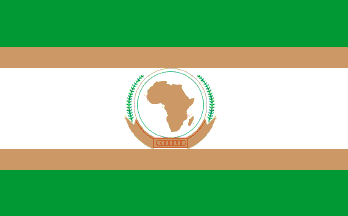
image by Marc Pasquin

Last modified: 2014-05-29 by zoltán horváth
Keywords: oau | africa | organization of african unity | african union | international organization | map |
Links: FOTW homepage |
search |
disclaimer and copyright |
write us |
mirrors
See also:
The Organization of African Unity recently changed
into the African Union (http://www.africa-union.org). The logo seems to be
unchanged, but today I saw the flag of African Union hoisted along with Libyan
plain green flag in front of Libyan Embassy, here in Belgrade. The proportions
are changed from the old OAU flag, with the stripes having the ratio 3:1:8:1:3
and the emblem proportionately larger. I don't now if this is official change,
but the flag is in use, at least here, in the Libyan embassy in Belgrade.
Ivan Sarajcic, 22 July 2002
I am inclined to classify this "new" flag as an erroneous version of
the old OAU flag in use in this particular place.
Željko Heimer, 23 July 2002
The African Union website reports:
Broad green horizontal stripe at the top followed by a narrow band of gold. Broad white stripe bearing the Emblem at its centre followed by a narrow gold band and broad green stripe at the bottom.The emblem is described as:
- The gold colour stands for African wealth and bright future.
- The colour white represents the purity of Africa's desire to have genuine friends throughout the world.
![[OAU Flag]](../images/i/int-au3.gif)
image
by Ivan Sarajcic and Eugene Ipavec, 18 February 2007
Another variant of the flag of the African Union was seen on January 29, 2007
on the BBC news website (http://news.bbc.co.uk/2/hi/africa/6310025.stm).
It displays a flag very similar in colors to that above but the ratio of the
coat of arms resembles the OAU flag (below). This seems to be
a variant with
1. a darker shade of green
2. almost equally-wide green and gold stripes - proportions are approx.
3-2-7-2-3.
3. a relatively tiny emblem
I think the flag is not all that standardized; the ones I see being used by AU
peacekeepers in the news vary a fair bit.
Eugene Ipavec, 18 February 2007
Members (as of 1997-12-01): Algeria, Angola, Benin, Botswana, Burkina Faso, Burundi, Cameroon, Cape Verde, Central African Republic, Chad, Comoros, Congo (Dem. Rep.), Congo (Rep.), Côte d’Ivoire, Djibouti, Egypt, Equatorial Guinea, Eritrea, Ethiopia, Gabon, the Gambia, Ghana, Guinea, Guinea-Bissau, Kenya, Lesotho, Liberia, Libya, Madagascar, Malawi, Mali, Mauritania, Mauritius, Mozambique, Namibia, Niger, Nigeria, Rwanda, Săo Tomé & Príncipe, Senegal, Seychelles, Sierra Leone, Somalia, South Africa, the Sudan, Swaziland, Tanzania, Togo, Tunisia, Uganda, Zambia, Zimbabwe and the Sahrawi Arab Democratic Republic (West Sahara)
Morocco — not a member since 1984.11, because of the West Sahara question (ed.)
The OAU was founded on 25 May 1963 but it was only in 1970 that the flag was adopted. The multi-nation committee which designed the flag ignored personal, political and national jealousy and worked on the symbolism of the flag regardless of the color or patterns prevalent within the individual states.
The flag is a horizontal triband of green, white and green, with the bands separated by narrow gold stripes. In the center is a map of Africa in gold, within a green and gold wreath. There are seven interlocking red rings at the base.
The green is for the vegetation of sub-Saharan Africa and the gold is for the deserts of the north. The white stands for peace and unity. It may be surprising that black is not included, but the reason is that not all Africans are black and it was intended that the flag should avoid even the smallest suggestion of racism.
Following the election of a democratic government in South Africa in 1994, all countries on the continent are now members of the Organisation (except Morocco).
Bruce Berry 16 April 1998
The idea of the African Union is at least 40 years old, and Kwame Nkrumah
was its main proponent. At the OAU summit in 2000, Ghadaffi proposed the name
United States of Africa (also not his idea), but the delegates rejected it in
favour of 'African Union'. Ghadaffi's association with the Union derives from
his publicising and hosting the OAU Sirte Summit in Libya at which the Union
Act was ratified.
Dan Kashagama (General Secretary, African Unification Front),
14 Nov 2001